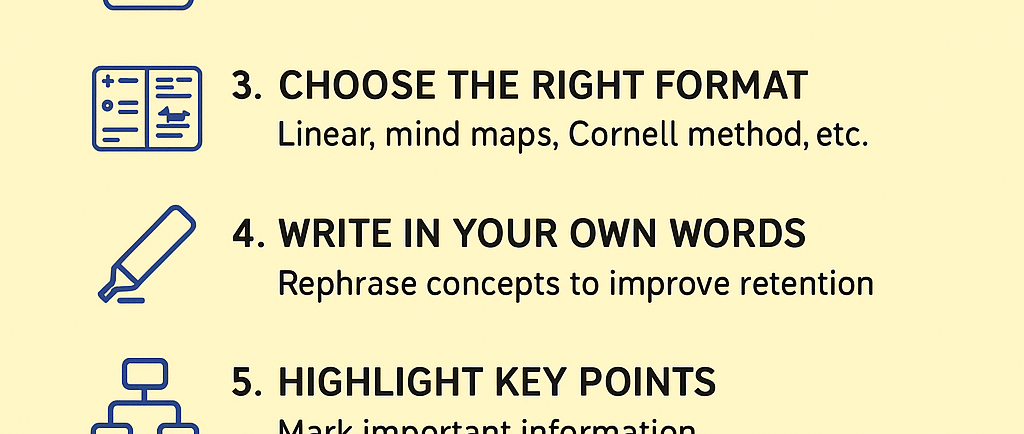How to Prepare Notes for Exams: A Smart Student’s Guide


Preparing effective notes for exams is one of the most powerful study techniques to boost your memory, understanding, and performance. Well-organized notes not only save time during revision but also enhance retention and reduce last-minute stress. Here’s a step-by-step guide on how to prepare exam-ready notes the right way.
1.Start with the Syllabus
Before you begin, get a copy of your syllabus or exam blueprint. Highlight the key topics, chapters, or concepts that are frequently asked. This helps you focus only on what’s important and prevents wasting time on less relevant material.
2.Use Class Notes as a Foundation
Your classroom notes are your first resource. Review them within 24 hours of the lecture to keep the material fresh. Clean them up by removing unnecessary content, correcting mistakes, and adding missing information using your textbook or reference material.
3.Choose the Right Format
Different students learn differently. Here are three popular note formats:
Linear Notes: Bullet points or numbered lists. Good for quick revision.
Mind Maps: Visual diagrams connecting ideas. Great for visual learners and complex subjects.
Cornell Method: Divide the page into 3 sections—notes, cues, and summary. It helps with active recall and self-testing.
Choose the one that suits you best—or use a mix!
4.Write in Your Own Words
Avoid copying textbook lines directly. Instead, rephrase key concepts in your own words. This forces your brain to process the information and improves long-term retention. Use short sentences, symbols, and abbreviations to save time.
5.Highlight Key Points
Use highlighters, underlining, or color-coded pens to mark definitions, formulas, dates, and important keywords. This makes your notes visually appealing and easier to scan during revision.
6.Use Charts and Diagrams
Where possible, simplify data-heavy content into tables, flowcharts, or diagrams. For subjects like biology, history, or geography, visual summaries can drastically speed up learning.
7.Review and Revise Regularly
Preparing notes isn’t a one-time activity. Set aside 10–15 minutes weekly to review and refine them. Add any new insights from homework, assignments, or sample papers.
8.Digital or Physical Notes?
Both have their advantages. Digital notes (apps like Notion, OneNote, or Google Docs) are searchable and easy to update. Handwritten notes are better for memory. Choose what helps you focus more.
9.Keep It Concise but Complete
Notes should not become mini-textbooks. The goal is to make a summary—not copy every word. Aim to capture the essence of the topic in 1–2 pages per chapter.
Conclusion
Good exam notes are like a map—they guide your revision, boost your confidence, and save time. Start early, be consistent, and adapt your style to what works for you. With the right approach, your notes will become your most powerful exam weapon.
